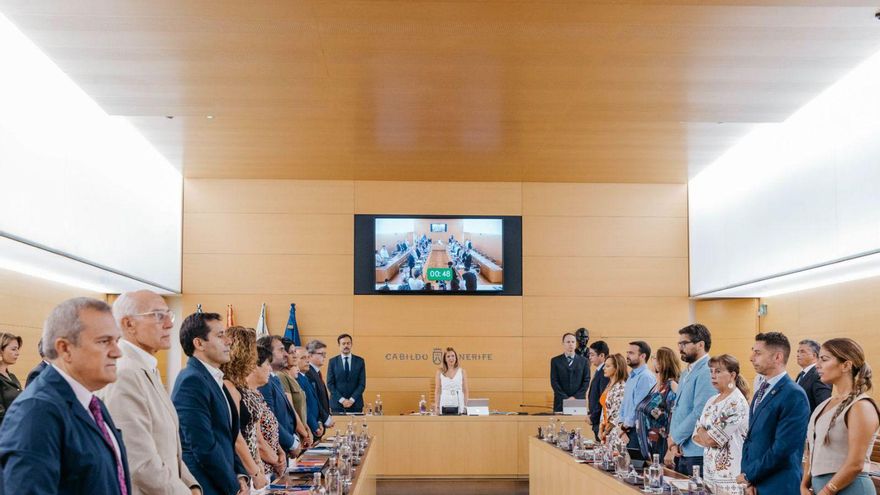
The day when the president of the Cabildo, Rosa Daviladeclares the forest fire formally controlled (it goes to level zero), the Plenary urges the central Government to create a permanent base in Canary Islands of highly capable state air means (seaplanes and helicopters). The measure is part of an institutional agreement that seeks to provide the Island with the services, human and material resources that guarantee prevention and intervention in the face of future and inevitable firesas predicted by the four political groups represented in the Corporation.
Modify the protocol to facilitate the intervention of the Military Emergency Unit (UME) from level 1, create in Tenerife a base of Intervention and Reinforcement Teams in Forest Fires (Eirif), draft the preliminary draft of the Forest Law of the Canary Islands, promote specific prevention plans, a reforestation plan for the affected area with financial support and an urgent nature and maintain the roads, Tracks, roads and trails in the forest and interface areas also make up the institutional agreement.
It, which contains eleven points, encourages the parties represented in the Plenary, forestry and agricultural professionals, primary and tourism sector organizations, universities and researchers to dialogue about a territorial model in which uses and exploitation in rural areas, intensive livestock farming, grazing and the creation of strategic areas “are fundamental in the preservation of natural heritage.” Added to this is the incorporation of production models that strengthen and regenerate biodiversity, in addition to adapting eco- and agrosystems to the climate change scenario, as well as the abandonment of agricultural land.
The existing technological solutions that allow detecting, verifying, analyzing, classifying the fire and providing an immediate response that helps extinction operations in real time; a specific program with the Official College of Psychologists of Santa Cruz de Tenerife to care for those affected and an action protocol between the Cabildo and the town councils, animal protection associations, livestock breeders and the Official College of Veterinarians to evacuate farms, shelters animals and pets in a situation of danger due to fire are aspects agreed upon by CC, PP, PSOE and Vox.
The same as promoting the drafting of a coordination and communication protocol between the areas and services of the Cabildo and the town councils of the Island with the Insular Volunteer Office.
Suspicions
“Terrible”, “an ecological and human disaster”, “a monster with a life of its own” as well as “an environmental catastrophe” are expressions with which the president of the Cabildo defined the fire, considered controlled after 27 days since its beginning, almost at midnight on August 15. It affected 7% of the island’s surface (more than 14,000 hectares), with a diameter of 90 kilometers and more than 13,300 evacuees. “Everything suggests that it was intentional,” said Dávila, “the worst in Tenerife in the last 40 years,” he stated before stating that it caused damage of more than 83 million euros.
The tone of all the interventions was gratitude for the “unwavering support” of all the spokespersons of the Cabildo, with special reference to the “good advice and suggestions” of the former president, Pedro Martin. He highlighted the “avalanche of solidarity” of Tenerife society and the management of the Canarian and central governments, with special emphasis on the Minister of Industry, Commerce and Tourism, Héctor Gómez.
More than 900 people participated in the device that received all the congratulations and thanks from the island authorities, as well as the “exemplarity, humanity and life lesson that those affected gave us.” “In you we stage the efforts of politicians,” he referred to the island’s security and emergency advisor, Blanca Pérez.
The institutional agreement is the result of the lessons that authorities say they have learned from the forest fire. Ana Salazar (vox) showed “recognition and gratitude” to the fire extinguishing teams because “they do not fight the fire from the ego.”
Lope Afonso (PP) stressed that the agreement “is an exercise in Tenerifeism”, said that “the general interest is put first” and recognized that “we must value what is well done and take note to improve what can be improved” in order to “strengthen the response capacity.”
There will be more
Blanca Pérez (cc) assessed that the damage was “minimal” (no homes burned), but it is the “most complex” fire in recent decades. The coordination work was “magnificent”, she defended the advice of external professionals, assured that there will be more fires in the interface area, so it is necessary to polish the protocols of forestry and fire brigades. In this regard, she claimed the increase and stability of both templates.
Pedro Martín (PSOE) said that with the fires “there is no partisanship”, although he pointed out that there was a lack of “collaboration and coordination” with the mayors, who were not summoned to the PEIN meeting and “they found out what was happening through the media”. He pointed out that there were difficulties in distributing food to those affected and with some evacuations, he questioned Federico Grillo’s leadership in communication as a worker at the Cabildo of Gran Canaria, although he recognized his professional value. He clarified that his government rejected the fire detection project for another “broader” one that served to deal with all types of emergencies. «There is a lot of work to be done in regulations and investments. They will find us there,” Martín concluded.















